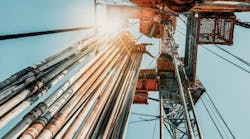Maureen Lorenzetti
Multinational oil and natural gas companies aren't the only ones with an LNG fixation. Regulators are following industry's lead and are trying to predict LNG's impact on future US natural gas markets.
"North America can no longer meet demand for natural gas at traditional price levels with indigenous resources," said a new report released by Wakefield, Mass.-based Energy Security Analysis Inc. "The US has already begun to depend on surging LNG imports for enough supplies to affect domestic gas prices."
Recent responses
As the gas market changes, regulators scramble to update LNG rules.
The US Federal Energy and Regulatory Commission, in an industry-supported action last month, affirmed that regulatory authority for LNG import terminal siting and construction rests exclusively with the federal government.
The commission clarified its position after the California Public Utilities Commission claimed the state had jurisdiction over LNG facilities within its borders.
FERC also announced a new branch within its Office of Energy Projects devoted to LNG. The LNG Engineering Branch will be responsible for the commission's LNG inspection program and for ensuring coordination among other relevant agencies, including the US Coast Guard and the US Department of Transportation's Office of Pipeline Safety.
Unresolved concerns
FERC held a technical conference Feb. 18 on natural gas interchangeability and gas quality issues. The American Gas Association, representing local utilities, asked FERC to give industry time to reach a consensus on how to balance quality differences between LNG and US natural gas. Still to be determined is how much, if any, ratepayers will pay for those gas quality differences.
LNG has a relatively high btu content compared with domestic natural gas. LNG producers want a FERC standard sooner rather than later, but they also urged the commission to meet with other public and private sector interests so rules are not crafted in a policy vacuum.
Outside FERC, US natural gas producers Mar. 5 asked the secretaries of Homeland Security and the Department of the Interior to ensure new LNG facilities don't block offshore drilling blocks.
"We are increasingly concerned about the possibility that tracts may be withdrawn from future Gulf of Mexico lease sales, or that existing leases may be impaired, at the request of some LNG import facility proponents," wrote four producer groups. "Those proponents may believe that certain lease activity could interfere with terminal facility construction or operation, or require less-than-preferable sea lane access to those facilities."
US producers said they support building an LNG infrastructure but not if it means their leases are compromised.
"What we do not support and will actively oppose is any process that allows LNG proponents to receive lease tract sale withdrawals, stipulations, or other restrictions without full disclosure of what is being requested and an opportunity to comment on such requests and have our comments fully considered in advance of decisions related to them," they said.
Author contact: [email protected]
